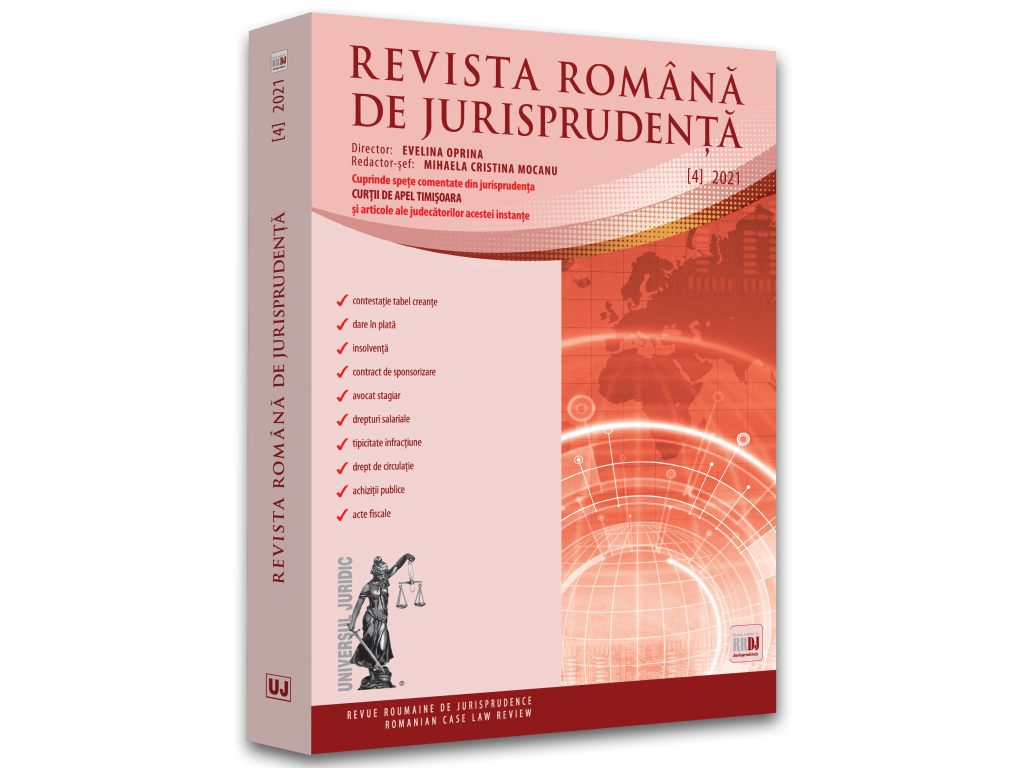Pension rights for forestry staff. The use of periods during which forestry staff have worked in places of work with special conditions under Article 20(2) – (4) of GEO no. 59/2000
DREPTUL MUNCII ŞI SECURITĂŢII SOCIALE
Abstract
Jobs involving the performance of at least one of the activities referred to in Article 20(2) of the GEO no. 59/2000 (i.e. forestry, hunting and fishing grounds and protected natural areas, forestry and hunting control, logging, forestry construction, specific field work in forestry and afforestation) are considered as jobs under special conditions, considering the special nature of the working conditions resulting from the performance of these activities, but, the law wishes to specify, such classification is made according to legal regulations. The fact that the law specifically indicates that workplaces in which one of the listed activities is carried out are workplaces under special conditions, while referring to the legal provisions adjacent to the field of interest in question, clearly shows that the intention of the legislature is to make the classification of those jobs as special conditions jobs and the consequent compensation for the work and occupational risks to which forestry staff are exposed, including the receipt of benefits on the date of entitlement to a pension, conditional on compliance with the legal requirements laid down in the relevant statutory provisions, in particular those contained in the Special Pensions Act. The logical consequence of this regulation is that the classification of the jobs referred to in Article 20(2) of GEO no. 59/2000 under special conditions must also be subject to the criteria laid down in Art. 3 para. (1)(h) of Law no. 263/2010, implicitly to the criterion relating to the employee's actual exposure to risk factors for more than 50% of normal working time, which is a general criterion applicable to any classification of jobs in special conditions.
At the same time, the special regulation does not contain an exemption from the obligation to pay social security contributions relating to special conditions, or, as long as the classification of the activities carried out by forestry staff under special conditions was made ope legis, but in compliance with the regulations adjacent to the field of interest, it is obvious that the recognition of the benefits sought by the claimant at the date of the opening of pension rights is conditional on the payment of social security contributions to the state budget, according to Art. 138 of the Tax Code, which regulates a rate of 8% payable in the case of special working conditions, as provided for in Law No. 263/2010, by natural and legal persons who are employers or are assimilated to them.
It is true that, according to Article 45 of Law No 263/2010, the contribution period is made up of the sum of the periods for which contributions to the state social insurance budget were due by the insured person and, where applicable, by the employer, the text does not refer to the payment of the compulsory contribution, but the pensionable employment under special conditions cannot be taken into account in the absence of corrective declarations. The lack of corrective statements indicates that employers have not yet registered special working conditions, even though Article 20(4) of GEO no. 59/2000 stipulates that the period of service under special working conditions shall be recorded by the employers, which should have been clearly reflected in the corrective tax returns submitted to the competent institution. This is all the more so since the final paragraph of Article 159 of Law no. 263/2010 stipulates that, as of 01 April 2001, proof of the period of contribution to the public pension system shall be provided by means of a certificate issued by the territorial pension offices on the basis of the declarations on the nominal register of insured persons and payment obligations to the state social insurance budget.








